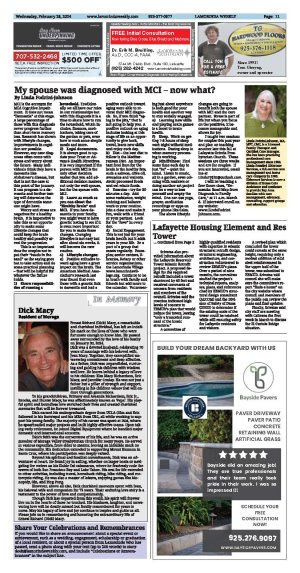|
|
Published February 28th, 2024
|
My spouse was diagnosed with MCI - now what?
|
|
| By Linda Fodrini-Johnson |
 |
| Linda Fodrini-Johnson, MA, MFT, CMC, is a Licensed Family Therapist and Certified Care Manager. She has been practicing professional care management since 1984. Linda founded Eldercare Services, a full-service care management and home care company in 1989. Eldercare Services is now a division of Home Care Assistance and continues to provide Bay Area families with care management, advocacy, counseling, support groups and education. |
MCI is the acronym for Mild Cognitive Impairment. It does not mean "Dementia" at this stage. A large percentage of those with this diagnosis never progress further than short-term memory loss. Research has shown with lifestyle changes, improvements in cognition are possible.
 However, any new diagnoses often come with stress and worry about the future Many individuals think they have a dementia like Alzheimer's disease, but that is not the case at this point of the journey. It can progress to a dementia and further testing will determine the type of dementia someone might have. However, any new diagnoses often come with stress and worry about the future Many individuals think they have a dementia like Alzheimer's disease, but that is not the case at this point of the journey. It can progress to a dementia and further testing will determine the type of dementia someone might have.
 Worry and stress are negatives for a healthy brain. It is imperative to take this as an opportunity to make some lifestyle changes that could keep the brain healthy and possibly arrest the progression. Worry and stress are negatives for a healthy brain. It is imperative to take this as an opportunity to make some lifestyle changes that could keep the brain healthy and possibly arrest the progression.
 This is an important time for couples not to put their "heads in the sand" as the saying goes but to take action and do some practical planning - that will be helpful for whatever the future holds. This is an important time for couples not to put their "heads in the sand" as the saying goes but to take action and do some practical planning - that will be helpful for whatever the future holds.
 1) Share responsibilities of running a household. Traditionally we all have our roles in our relationships but with this diagnosis it is a time to share how to run the household, which includes, finances, medications, taking care of the garden or pets, even how to cook some simple meals and more. 1) Share responsibilities of running a household. Traditionally we all have our roles in our relationships but with this diagnosis it is a time to share how to run the household, which includes, finances, medications, taking care of the garden or pets, even how to cook some simple meals and more.
 2) Legal documents. It is always good to update your Trust or Advance Health Directives. It is very important if the person with MCI is the only other decision maker that you add additional decision makers, not only the well spouse, but for the spouse with MCI. 2) Legal documents. It is always good to update your Trust or Advance Health Directives. It is very important if the person with MCI is the only other decision maker that you add additional decision makers, not only the well spouse, but for the spouse with MCI.
 3) Learn as much as you can about the "Healthy Brain" and MCI If you have dementia in your family, you might want to have genetic testing to see if it is even more important for you to make these changes. Changing lifestyles is not easy but after about six weeks, it will become the new routine. 3) Learn as much as you can about the "Healthy Brain" and MCI If you have dementia in your family, you might want to have genetic testing to see if it is even more important for you to make these changes. Changing lifestyles is not easy but after about six weeks, it will become the new routine.
 4) Lifestyle changes: 4) Lifestyle changes:
 a) Positive attitudes toward aging have a great impact on the brain. The American Medical Association's research last year found that even those with a genetic link to dementia and had a positive outlook toward aging were able to reverse their MCI diagnosis So, if you think "aging is the pits," that is not going to help you. A positive outlook on aging includes looking at this stage of life as an opportunity to give back, travel, learn new skills and enjoy each day. a) Positive attitudes toward aging have a great impact on the brain. The American Medical Association's research last year found that even those with a genetic link to dementia and had a positive outlook toward aging were able to reverse their MCI diagnosis So, if you think "aging is the pits," that is not going to help you. A positive outlook on aging includes looking at this stage of life as an opportunity to give back, travel, learn new skills and enjoy each day.
 b) Diet - the best diet to follow is the Mediterranean Diet. An important food item for the brain is the healthy fats, such a salmon, olive oil, avocados and walnuts. Avoid processed foods and eat whole foods. b) Diet - the best diet to follow is the Mediterranean Diet. An important food item for the brain is the healthy fats, such a salmon, olive oil, avocados and walnuts. Avoid processed foods and eat whole foods.
 c) Exercise - try for 30 minutes a day. Add some resistance, weight training and balance work to your routine. Join a class and make it fun, walk with a friend or your partner Look for the "Awe" in every day. c) Exercise - try for 30 minutes a day. Add some resistance, weight training and balance work to your routine. Join a class and make it fun, walk with a friend or your partner Look for the "Awe" in every day.
 d) Social Engagement This is not just for your brain health but it adds years to your life Be a part of a group that meets regularly Examples; senior centers, libraries, Rotary or other service organizations, the Lamorinda Village www.lamorindavillage.org Continue to be in touch with family and friends but add more to the calendar Volunteering just about anywhere is both good for your health and another way to stay socially engaged d) Social Engagement This is not just for your brain health but it adds years to your life Be a part of a group that meets regularly Examples; senior centers, libraries, Rotary or other service organizations, the Lamorinda Village www.lamorindavillage.org Continue to be in touch with family and friends but add more to the calendar Volunteering just about anywhere is both good for your health and another way to stay socially engaged
 e) Learning new skills and playing brain games is a boost to brain health e) Learning new skills and playing brain games is a boost to brain health
 f) Sleep Work on getting 7-8 hours of sleep each night without medications During sleep is when memory processing is working f) Sleep Work on getting 7-8 hours of sleep each night without medications During sleep is when memory processing is working
 g) Mindfulness:? Find some time each day to just "be" - quiet the mind Listen to music, sit in a garden, even coloring with markers or doing another art project can be a way to lose yourself and empty the mind One can use yoga, prayer, meditation recordings or apps on your phone like Calm g) Mindfulness:? Find some time each day to just "be" - quiet the mind Listen to music, sit in a garden, even coloring with markers or doing another art project can be a way to lose yourself and empty the mind One can use yoga, prayer, meditation recordings or apps on your phone like Calm
 The above lifestyle changes are going to benefit both the spouse with MCI and the care partner. Stress is part of life but when you focus on the positives, it becomes manageable and allows for joy The above lifestyle changes are going to benefit both the spouse with MCI and the care partner. Stress is part of life but when you focus on the positives, it becomes manageable and allows for joy
 I taught two sessions for couples this past year and plan on teaching another late this fall at Lafayette Orinda Presbyterian Church These sessions are three weeks and are for couples If you are interested, email me at LindaFJ620@outlook.com I taught two sessions for couples this past year and plan on teaching another late this fall at Lafayette Orinda Presbyterian Church These sessions are three weeks and are for couples If you are interested, email me at LindaFJ620@outlook.com
 I will be teaching a free Zoom class, "Dementia: Road Map from Diagnosis to Family Care," at 11 a.m. March 8 If interested enroll on my website:
www.LindaFodriniJohnson.com I will be teaching a free Zoom class, "Dementia: Road Map from Diagnosis to Family Care," at 11 a.m. March 8 If interested enroll on my website:
www.LindaFodriniJohnson.com |
|
|
|
|
|
|
|
|
|
|
|
|
|


